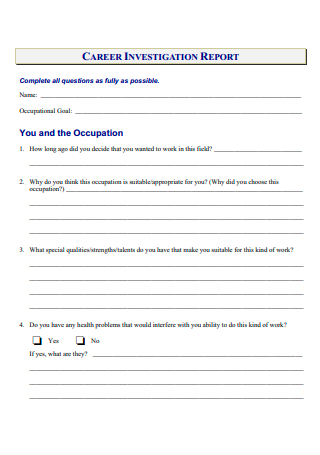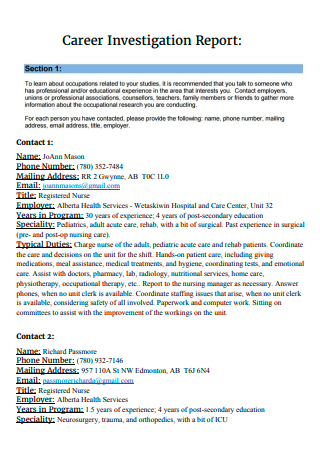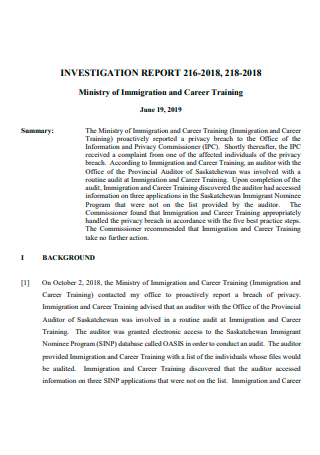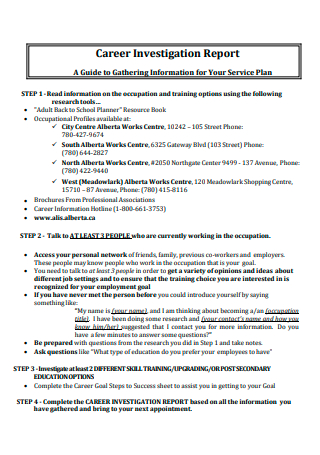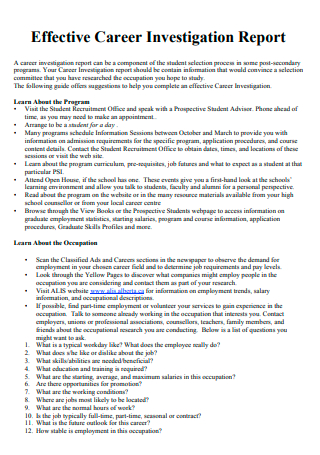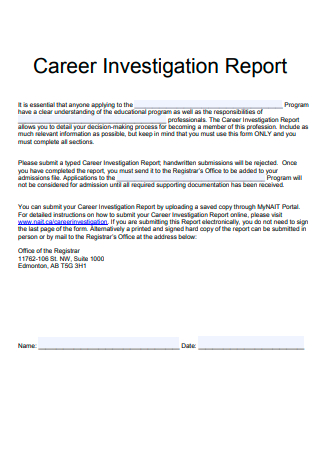5+ Sample Career Investigation Report
FREE Career Investigation Report s to Download
5+ Sample Career Investigation Report
What Is a Career Investigation Report?
Choosing a Career and Conducting Research
Career Options Narrowed
Choosing the Right Career
The Importance of Career Investigation
How to Write a Career Investigation Report
Tips For Discovering And Examining Your Career Possibilities
Advice on Picking a Career
FAQs
What does the term “career investigation” imply?
What is the benefit of looking at other career options?
Why is research important?
What Is a Career Investigation Report?
Some institutes of higher learning employ a career inquiry report in the admissions process for highly competitive programs. It is a written description of a job that a prospective student wishes to pursue. The career Investigation Report goes on to explain how the institution’s educational program prepares students for entry into the industry. It necessitates research and study of the curriculum and the desired career. It also helps students and course shiftees to perform a career assessment.
Choosing a Career and Conducting Research
The value of career research in assisting students in identifying the abilities required to succeed in a postindustrial world. Young people are introduced to the world of work and the numerous fascinating occupations that are accessible via career exploration. High school pupils who are enthralled by the possibilities are inspired to enroll in challenging courses and reach their full potential. Researching careers provides high school students and Career Change with an overview of the requirements for various jobs. Those who do not have the necessary college preparation abilities may find themselves spending extra time and money pursuing a degree or occupational qualification.
Career Options Narrowed
Choosing a job might be difficult unless you limit down your options. Clarifying your interests, abilities, aptitudes, and skills is the first stage in career planning. Look for topics that will help you decide if you like working with your hands, assisting others, or solving issues. You may explore various available occupations. Volunteering, internships, job shadowing, visiting career fairs, and meeting with career advisors are just a few examples. Inquire about the school and training needs, stresses, job responsibilities, safety issues, and career mobility of the jobs you’re interested in.
Choosing the Right Career
Before taking out student debts and enrolling in a program of study that may or may not lead to a decent career, do your research. Many people create career assumptions and are dissatisfied when the reality of the work falls short of their expectations. Such research might assist you in choosing a profession that you would enjoy and that is also in great demand. If you’re interested in a job in information technology, for example, knowing the needed degree, the projected salary for alumnae, and so on might be beneficial.
The Importance of Career Investigation
Finding a career that will provide you with job pleasure, personal fulfillment, and a steady paycheck takes thorough investigation. The procedure is extremely personalized. An ideal job for one person may be a nightmare for another. If you choose the incorrect career, you may find yourself in a dead-end position that does not utilize your skills. Conducting career research will assist you in matching your talents, interests, and pay requirements with the appropriate job field. Despite it being normal to change careers or shift to other options, it is better to be aware than going in blind.
How to Write a Career Investigation Report
Your career inquiry report should include facts that will persuade a selection committee that you have thoroughly investigated the profession you choose to pursue. After you’ve gathered information about the program and done some study on the career, you are ready to go. Speaking with people who are presently working in the industry can give you a better idea of what to expect. Examine typical wages, educational requirements, and experience requirements. Another approach to collect relevant knowledge is to volunteer or do part-time work in a job closely related to the vocation. For standardized forms or format requirements for the career investigation report, you may need to contact the program. Otherwise, there are available career investigation report samples you can use for references in making your own.
Step 1: Arrange the data in a logical manner.
Separate the data into three categories: headings, industry research, and autobiographical data. If the program has no format requirements or defined forms, only utilize those categories in the report itself. Check the available templates that the article has provided which you can use as a reference while writing your own report. This can also help you save time since a template already has a structure, rather than starting from scratch which will take you quite a while.
Step 2: Prepare a report.
After collecting information and data from various researches, it is finally time for the step to write your report. Reports on career investigations must be typewritten and no more than three pages in length. Since they are a written summary of the prospective career that you have your eyes on, be sure to state the objective and factual information about the career. This will showcase your interest to pursue the chosen career and act as proof that you have read and done your thorough research about it.
Step 3: Proofread the report.
Even if proofreading is considered the last step in preparing a career investigation report and can be overlooked by most, it is still important to review your document. Check for grammatical and punctuation problems in the document. Scan the paper for mistakes and correct them. The appearance of the career inquiry report must be professional, and grammar and punctuation problems will make it appear unprofessional.
Step 4: Submit your report.
This is the final step in writing a career investigation report. After you have thoroughly reviewed the contents of your report, not only check for grammatical errors or typos but also fact-check any statistical data included in the report. Afterward, you can finally proceed to rewrite the career investigation report’s final document and submit it to the authority or professor.
Tips For Discovering And Examining Your Career Possibilities
In doing your career survey, you would also need to be attuned with yourself in your interests, skills, and future setup. You can’t just choose a career based on nothing that relates to you, instead, the careers must have ties to your own goals and capabilities. These tips have been curated for you in order to help you come up with an effective career Investigation Report.
Advice on Picking a Career
Choosing a career is one of those pivotal decisions that may alter your life’s trajectory. Such a significant decision necessitates a great deal of thought and reflection. Ample knowledge and self-Evaluation can assist you in selecting a rewarding job that you will love for many years.
FAQs
What does the term “career investigation” imply?
Preliminary investigation on the desired career honors participants for their abilities to do self-assessments, study and explore a career, define career objectives, construct a strategy to achieve those goals, and articulate the link between curriculum and the chosen career. This can help you set up your College Student Resume to ponder over the experience and skillset you have under your belt.
What is the benefit of looking at other career options?
This will help you narrow down the sorts of jobs and vocations that best utilize your career assets. It will help you become more aware of the factors that will shape and/or impact your professional selections, as well as extend your perspective on the options accessible to you. You can even try conducting a Desk Research Report since it won’t necessarily have you need to gather first-hand accounts and could give you an initial idea on the career.
Why is research important?
There are several ways to conduct career research. The more research you undertake, the more fresh ideas and career options you will discover. You’ll still have to figure out which careers are ideal for you. However, if you don’t do your homework, your alternatives will always be restricted, and your job move may not be as beneficial as it may be.
Investing in your future is important because it will matter in the long run. There is nothing wrong with coming up with Career Plans in order to set yourself up for the future scenario of a workplace. You may be disheartened that your initial career choice may not be followed but the important thing is that there are also other careers that you may find more suitable and interesting. So lift that chin up and get to work on your career investigation report.

